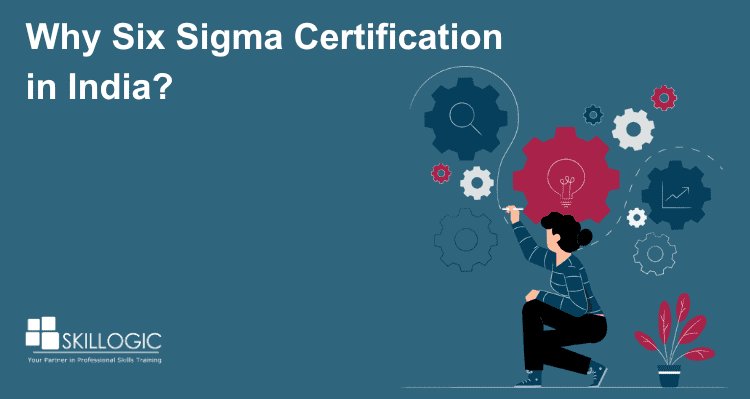Why Six Sigma Certification in India?

In today's fast-paced business environment, where every organization strives for excellence, efficiency, and competitive edge, Six Sigma certification has emerged as a beacon of quality management methodologies. India, being a burgeoning hub for various industries ranging from IT, manufacturing, healthcare, to services, witnesses a significant demand for professionals equipped with Six Sigma skills.
According to a report by Grand View Research, in 2022, the global market size for quality management software was estimated to be USD 9.38 billion. Projections suggest that it will grow to USD 10.18 billion by 2023. This article delves into the reasons why Six Sigma certification holds immense significance in India's competitive landscape.
Defining Quality Management
Quality management is a systematic approach that ensures products, services, and processes consistently meet or exceed customer expectations. It encompasses a range of activities aimed at planning, controlling, and improving quality throughout all stages of production or service delivery. Key principles of quality management include understanding customer needs, implementing robust processes, fostering a culture of continuous improvement, and striving for excellence in every aspect of operations.
According to a report by Polaris Market Research, the market size of Quality Management Software reached USD 9.92 billion in 2023. It is projected to grow from USD 10.83 billion in 2024 to USD 24.92 billion by 2032, demonstrating a compound annual growth rate (CAGR) of 11.0% throughout the forecast period. Effective quality management enables organizations to enhance customer satisfaction, reduce costs, minimize defects, and maintain a competitive edge in the market.
Explaining Six Sigma: Making Processes Better
Six Sigma is a methodology driven by data, aimed at enhancing business processes through the systematic identification and eradication of defects or deviations, ultimately striving for nearly flawless performance. It emphasizes rigorous measurement, statistical analysis, and systematic problem-solving techniques to reduce defects and improve efficiency, productivity, and customer satisfaction. By employing DMAIC (Define, Measure, Analyze, Improve, Control) or DMADV (Define, Measure, Analyze, Design, Verify) methodologies, organizations can achieve significant cost savings, increased quality, and enhanced competitiveness in today's dynamic business environment.
Read these articles:
Understanding Six Sigma Certification
Six Sigma is a methodology used to improve business processes by reducing defects and variability, thereby enhancing efficiency and quality. Originally emerging in the manufacturing sector, it has now been embraced across diverse industries such as healthcare, finance, and software development.
Six Sigma certification is a way for individuals to demonstrate their expertise in implementing and leading Six Sigma projects. There are several levels of Six Sigma certification, each indicating a different level of proficiency and responsibility:
- White Belt: This level provides a basic understanding of Six Sigma concepts and terminology. White Belt holders typically have a foundational knowledge of Six Sigma principles but do not lead projects.
- Yellow Belt: Yellow Belt certification signifies a deeper understanding of Six Sigma methodologies. Yellow Belts often work as team members on Six Sigma projects, assisting Green and Black Belts in implementing improvements.
- Green Belt: Green Belt certification denotes a higher level of proficiency in Six Sigma methodologies. Green Belts lead smaller Six Sigma projects within their respective departments or areas of expertise. They work under the guidance of Black Belts and are responsible for data collection, analysis, and implementation of process improvements.
- Black Belt: Black Belt certification represents mastery of Six Sigma concepts and techniques. Black Belts lead complex Six Sigma projects across the organization. They are skilled in statistical analysis, project management, and mentoring Green Belts and project teams.
- Master Black Belt: Master Black Belts are the highest level of Six Sigma certification. They are experts in Six Sigma methodologies and tools, often responsible for training and mentoring Black Belts and overseeing the organization's entire Six Sigma program.
Each level of Six Sigma certification typically requires passing an examination and completing a project demonstrating the application of Six Sigma principles to achieve measurable business results. Additionally, candidates may need to fulfill certain experience requirements before obtaining certification, especially at the higher levels.

The Significance of Six Sigma in Modern Business
Six Sigma, a methodology focused on enhancing quality and efficiency within processes, stands as a cornerstone in modern business strategies. Its importance reverberates through various aspects of organizational operations, offering substantial benefits in terms of cost reduction, customer satisfaction, and overall performance improvement. This methodology serves as a powerful tool for organizations striving to achieve operational excellence and maintain a competitive edge in today's dynamic markets.
At its core, Six Sigma emphasizes a data-driven approach to identify and eliminate defects or errors within processes, thereby minimizing variation and ensuring consistent quality output. By instilling a culture of continuous improvement, Six Sigma fosters innovation and empowers teams to tackle challenges systematically, leading to enhanced productivity and streamlined operations.
Furthermore, Six Sigma's structured methodology enables businesses to align their processes with customer requirements and market demands, driving greater customer satisfaction and loyalty.
Refer to these articles:
- Cyber Security Scope in India
- Six Sigma Certification Training Course Cost in India
- PMP Certification Training Course Cost in India
Navigating Career Avenues: Exploring Six Sigma Opportunities in India
In India, the adoption of Six Sigma methodologies has gained significant traction across various industries, creating a plethora of career opportunities for professionals seeking to specialize in process optimization, quality management, and operational excellence. Here's a guide to navigating Six Sigma career in India:
Six Sigma Specialist/Consultant: Professionals proficient in Six Sigma methodologies, such as DMAIC (Define, Measure, Analyze, Improve, Control) and Lean principles, are in high demand across industries ranging from manufacturing and IT to healthcare and services. These specialists are responsible for leading process improvement projects, implementing Six Sigma initiatives, and driving organizational change to enhance efficiency and quality standards.
Quality Manager/Engineer: Quality management is integral to the success of any organization, and Six Sigma expertise is highly valued in roles such as Quality Manager or Quality Engineer. These professionals oversee quality assurance processes, conduct root cause analyses, and implement corrective and preventive measures to ensure adherence to quality standards and regulatory requirements.
Process Improvement Analyst: Organizations seeking to optimize their operations often rely on Process Improvement Analysts to identify inefficiencies, streamline workflows, and enhance productivity. Professionals with Six Sigma certification possess the analytical skills and problem-solving acumen necessary to analyze data, identify improvement opportunities, and drive operational excellence initiatives.
Project Manager: Six Sigma-trained Project Managers play a crucial role in executing process improvement projects within organizations. These individuals are adept at leading cross-functional teams, managing project timelines and resources, and implementing Six Sigma methodologies to achieve project objectives, whether it's reducing defects, improving cycle times, or enhancing customer satisfaction.
Training and Development Specialist: With the growing emphasis on building a culture of continuous improvement, organizations require Training and Development Specialists well-versed in Six Sigma principles to impart training and mentorship to employees at all levels. These specialists design and deliver Six Sigma training programs, facilitate workshops, and mentor Green and Black Belt candidates to ensure widespread adoption and proficiency in Six Sigma methodologies.
Supply Chain Analyst/Manager: In the realm of supply chain management, Six Sigma expertise is invaluable for optimizing processes, reducing waste, and enhancing overall efficiency. Supply Chain Analysts or Managers with Six Sigma certification are equipped to identify bottlenecks, implement process improvements, and foster collaboration with suppliers and partners to streamline logistics and improve supply chain performance.

Benefits of Six Sigma Certification in India
Obtaining a Six Sigma certification in India can offer several benefits, both for individuals and organizations. Here are some of the key advantages:
Enhanced Career Opportunities: Six Sigma certification is widely recognized by industries across the globe, including India. Holding a Six Sigma certification can significantly enhance your career prospects, making you more attractive to employers seeking professionals with expertise in process improvement and quality management.
Increased Salary Potential: With the demand for Six Sigma professionals on the rise, certified individuals often command higher salaries compared to their non-certified counterparts. In India, where the job market is competitive, having a Six Sigma certification can give you a competitive edge and lead to better salary negotiations.
Improved Quality Management Skills: Six Sigma certification equips individuals with a structured approach to problem-solving and process improvement. Through rigorous training and practical application, certified professionals develop advanced skills in data analysis, statistical methods, and project management, enabling them to drive quality improvements within their organizations.
Organizational Benefits: For companies operating in India, implementing Six Sigma methodologies can lead to significant cost savings, increased efficiency, and improved customer satisfaction. By training employees in Six Sigma principles and methodologies, organizations can foster a culture of continuous improvement and achieve sustainable business growth.
Global Recognition: Six Sigma certification is globally recognized and respected across various industries. Whether you're working for a multinational corporation or a local Indian company, holding a Six Sigma certification demonstrates your commitment to quality and process excellence, making you a valuable asset to any organization.
Steps to achieve Six Sigma certification in India
Achieving Six Sigma certification in India typically involves several steps. Six Sigma certification demonstrates an individual's proficiency in the Six Sigma methodology, which focuses on improving processes and reducing defects to achieve near-perfection. Here are the general steps to achieve Six Sigma certification in India:
- Understand Six Sigma: Before pursuing certification, it's essential to understand what Six Sigma is and how it's applied in various industries. There are many online resources, books, and courses available to gain this knowledge.
- Select a Certification Level: Six Sigma certifications are offered at various tiers, including White Belt, Yellow Belt, Green Belt, Black Belt, and Master Black Belt levels. Choose the level that aligns with your career goals and current expertise.
- Training: Enroll in a Six Sigma training program accredited by reputed organizations like the American Society for Quality (ASQ) or the International Association for Six Sigma Certification (IASSC). Many training providers in India offer classroom and online courses.
- Complete Training Modules: Attend the training sessions and complete all required coursework. This typically includes learning about Six Sigma principles, statistical tools, DMAIC (Define, Measure, Analyze, Improve, Control) methodology, and practical applications.
- Gain Practical Experience: Apply the concepts learned during training to real-world projects within your organization. This practical experience is crucial for mastering Six Sigma techniques and demonstrating your competence.
- Pass Certification Exam: After completing the training, you'll need to pass a certification exam to validate your knowledge and skills. The exam format and requirements vary depending on the certification level and the certifying body. Be sure to prepare thoroughly for the exam.
- Obtain Certification: Once you pass the exam, you'll receive your Six Sigma certification from the certifying body. This certification demonstrates your proficiency in Six Sigma methodologies and can enhance your career prospects.
- Maintain Certification: Some certifying bodies require ongoing professional development and recertification to maintain your Six Sigma certification. Make sure to fulfill any requirements for maintaining your certification status.
Read this article: Let’s Understand the 5 S of Six Sigma
Six Sigma Certification Training Cost in India
Six Sigma has demonstrated significant advantages for both the business and IT sectors, rendering it an attractive career path for individuals aiming to pursue opportunities within companies operating in these industries. Generally, the price for Six Sigma certification in India ranges from INR 25,000 to INR 40,000. In India, SKILLOGIC Institute is the leading provider of exceptional certification.
SKILLOGIC offers a range of Six Sigma certification courses in India, each with diverse pricing plans available.
- The online Six Sigma certification course in India is INR 56,000. Alternatively, students can choose live online training at a reduced rate of INR 34,900.
- For those who prefer self-paced learning, the course starts at INR 34,000, with enrollment in the full course available for just INR 20,900.
- Individuals interested in offline Six Sigma training in India can begin at INR 56,000, with a discounted rate of INR 34,900 available.
For newcomers venturing into Six Sigma, SKILLOGIC presents an excellent entry point with an exceptional offering for Six Sigma Green Belt certification training costs in India.
Six Sigma Green Belt Training Options:
- Online Training: Original Price: INR 26,000, Discounted Price: INR 15,900
- Self-Paced Training: Original Price: INR 16,000, Discounted Price: INR 9,900
- Classroom Training: Original Price: INR 26,000, Discounted Price: INR 15,900
Six Sigma Black Belt Training Options:
- Online Training: Original Price: INR 40,000, Discounted Price: INR 24,900
- Self-Paced Training: Original Price: INR 40,000, Discounted Price: INR 24,900
- Classroom Training: Original Price: INR 40,000, Discounted Price: INR 24,900
Factors Affecting Six Sigma Certification Cost In India
Several factors can influence the cost of Six Sigma certification training in India. Below are several pivotal factors:
- Training Provider: The reputation, experience, and accreditation of the training provider can significantly affect the cost. Established and well-known training institutes may charge higher fees compared to newer or less recognized ones.
- Certification Level: Six Sigma certification is available at different levels such as Yellow Belt, Green Belt, Black Belt, and Master Black Belt. The cost varies depending on the level of certification you are pursuing, with higher levels generally commanding higher fees.
- Training Format: The cost can vary based on the format of the training, whether it's in-person classroom training, virtual instructor-led training, self-paced online courses, or a blended approach combining different formats.
- Duration of Training: Longer training programs with more extensive coverage of topics may cost more than shorter, more focused courses.
Course Content and Materials: The comprehensiveness and quality of course materials provided, including textbooks, workbooks, case studies, and software tools, can influence the cost.
Salary of Six Sigma depending on Certification Level in India
The salary of a Six Sigma professional in India can vary depending on several factors, including the level of certification, years of experience, industry, company size, and location. Here's a general idea of the salary range based on certification levels:
- Six Sigma White Belt: Professionals with this certification often serve as team members or play supporting roles in projects. The Six Sigma White Belt Certification Salary in India ranges from INR4,74,000 per annum according to a PayScale report, depending on other factors such as experience and industry.
- Six Sigma Yellow Belt: Yellow Belt holders may receive slightly higher salaries compared to White Belt holders. They often assist Green and Black Belts in their projects. The Six Sigma Yellow Belt Certification Salary in India ranges from INR 5,78,000 per annum according to a PayScale report.
- Six Sigma Green Belt: Green Belt holders lead smaller projects or assist Black Belts in larger projects. They typically command higher salaries due to their increased responsibilities and expertise. The salary for Six Sigma Green Belts in India ranges from INR 20,36,321 per annum according to a Glassdoor report.
- Six Sigma Black Belt: Black Belts are proficient individuals in Six Sigma methodologies and frequently spearhead significant improvement projects within their organizations. They usually command the highest salaries among Six Sigma professionals. According to the AmbitionBox report, the salary for Six Sigma Black Belt in India ranges from INR 16.2 lakhs per annum or even higher, depending on factors such as experience industry and location.
The significance of Six Sigma certification cannot be emphasized enough. Individuals must maintain their competitiveness and employability in an environment where job opportunities are becoming scarcer. For employers, having the assurance that their production lines are managed by professionals who prioritize quality brings a sense of reassurance and peace of mind.
Prospective candidates have the opportunity to enroll in training programs offered by SKILLOGIC Institute, a renowned global training provider known for its specialized certification courses in Project Management, Quality Management, Cyber Security, Software Development, and Business Analytics. With a proven track record spanning over a decade, SKILLOGIC® is recognized as an industry leader, serving a diverse international student community of over 100+ learners. With a comprehensive range of over 25 accreditations and partnerships, and backed by a dedicated team of more than 100 experienced instructors, SKILLOGIC® offers a robust learning environment for individuals seeking to upgrade their skills and propel their careers forward.

 admin
admin 



